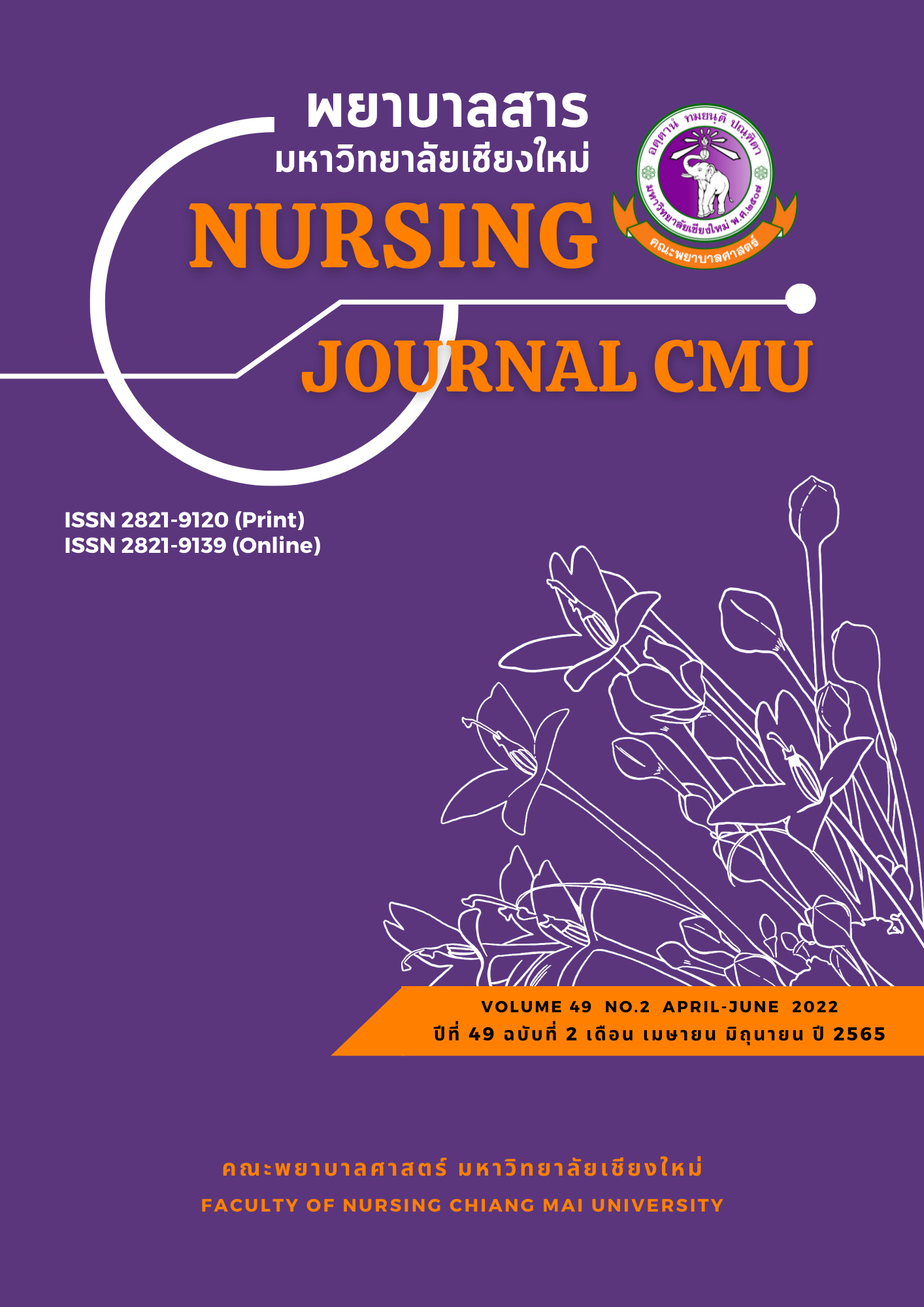ภาวะผู้นำที่แท้จริงของหัวหน้าหอผู้ป่วยและความเจริญก้าวหน้าในงานของพยาบาล ในโรงพยาบาลมหาวิทยาลัยของรัฐ
คำสำคัญ:
ความเจริญก้าวหน้าในงาน, ภาวะผู้นำที่แท้จริง, หัวหน้าหอผู้ป่วยบทคัดย่อ
ความเจริญก้าวหน้าในงาน ส่งผลให้เกิดทัศนคติเชิงบวกในการพัฒนาตนเอง จนเกิดผลการปฏิบัติงาน
ที่ดี การวิจัยแบบหาความสัมพันธ์นี้ มีวัตถุประสงค์เพื่อศึกษาการรับรู้ภาวะผู้นำที่แท้จริงของหัวหน้าหอผู้ป่วย ความเจริญก้าวหน้าในงาน และความสัมพันธ์ระหว่างภาวะผู้นำที่แท้จริงของหัวหน้าหอผู้ป่วยกับความเจริญ ก้าวหน้าในงานของพยาบาลในโรงพยาบาลมหาวิทยาลัยของรัฐ กลุ่มตัวอย่างคือพยาบาลที่มีประสบการณ์
อย่างน้อย 1 ปี คัดเลือกแบบชั้นภูมิ 383 คน รวบรวมข้อมูลโดยใช้แบบสอบถามภาวะผู้นำที่แท้จริงของ นีเดอร์ และ ซรีไซม์ (Neider & Schriesheim, 2011) แบบสอบถามการรับรู้ความเจริญก้าวหน้าในงานของ โพราท, สเปรเซอร์, กิบสัน, และ การ์เน็ตต์ (Porath, Spreitzer, Gibson, & Garnett, 2012) มีค่าความเชื่อมั่นเท่ากับ 0.92 และ 0.72 ตามลำดับ วิเคราะห์ข้อมูลด้วยสถิติสถิติเชิงพรรณนา และ Spearman’s rank-order correlation.
ผลการวิจัยพบว่า
- 1. ภาวะผู้นำที่แท้จริงของหัวหน้าหอผู้ป่วยตามการรับรู้ของพยาบาลในโรงพยาบาลมหาวิทยาลัยของรัฐอยู่ในระดับมาก
- 2. ความเจริญก้าวหน้าในงานตามการรับรู้ของพยาบาลในโรงพยาบาลมหาวิทยาลัยของรัฐ อยู่ในระดับปานกลาง ด้านพลังอยู่ในระดับปานกลาง และด้านการเรียนรู้อยู่ในระดับมาก
- 3. ภาวะผู้นำที่แท้จริงของหัวหน้าหอผู้ป่วย มีความสัมพันธ์ทางบวกในระดับปานกลางกับความเจริญก้าวหน้าในงานของพยาบาล นอกจากนี้ยังมีความสัมพันธ์ทางบวกในระดับปานกลางกับพลังในการทำงานของพยาบาล และความสัมพันธ์ทางบวกในระดับต่ำกับการเรียนรู้ในงานของพยาบาล
ผลการศึกษาครั้งนี้ ผู้บริหารทางการพยาบาลและผู้บริหารโรงพยาบาลสามารถนำไปใช้ในการกำหนด
กลยุทธ์ในการพัฒนาภาวะผู้นำที่แท้จริงของหัวหน้าหอผู้ป่วยและส่งเสริมความเจริญก้าวหน้าในงานของพยาบาลในโรงพยาบาลมหาวิทยาลัยของรัฐ
เอกสารอ้างอิง
Akkadechanunt, T. (2019). Nurses’ Competency and Public Healthcare Innovations in Thailand 4.0 Era. Thai Journal of Nursing Council, 34(1), 5-13. (in Thai)
Avolio, B. J., Gardner, W. L., Walumbwa, F. O., Luthans, F., & May, D. R. (2004). Unlocking the mask: A look at the process by which authentic leaders impact follower attitudes and behaviors. The Leadership Quarterly, 15(6), 801-823.
Baron, L., & Parent, É. (2015). Developing authentic leadership within a training context: Three phenomena supporting the individual development process. Journal of Leadership & Organizational Studies, 22(1), 37-53.
Burn, N., & Grove, S. K. (2005). The practice of nursing research: Conduct, critique & utilization (5thed.). Philadelphia: W. B. Saunders.
Elkholy, S. M., El Dahshan, M. E. A., & Abd El Mageed, H. H. (2020). Authentic leadership and its relation to structural empowerment and work environment among nurses. American Journal of Nursing, 9(1), 136-144.
Hilton, A. & Skrutkowski, M. (2002). Translating instruments into other languages: Development and testing processes. Cancer Nurse, 25(1), 1-7.
Kanyana, B., Abhicharttibutra, K., & Chitpakdee, B. (2020). Head nurses’ motivating language and registered nurses’ job performance, government university hospitals. Nursing Journal, 47(2), 320-32. (in Thai)
Kaptoom, J., Sirichotiratana, N., Prutipinyo, C., & Pobkeeree, V. (2019). Professional nurses’ work life quality in a public university hospital. Journal of The Royal Thai Army Nurses, 20(3), 353-62. (in Thai)
Leelawong, S. (2017). Guidelines for succession planning in the field of professional nursing according to the principles of good governance. Pathum Thani: Tawan media. (in Thai)
Ministry of Higher Education Science Research and Innovation (2021). Affiliated higher education institutions. Retrieved from https://www.mhesi.go.th/index.php/service/higher-education.html. (in Thai)
Mortier, A. V., Vlerick, P., & Clays, E. (2016). Authentic leadership and thriving among nurses: The mediating role of empathy. Journal of Nursing Management, 24(3), 357-365.
Nakngam, N., Hinchiranan, S., & Khaikaew, S. (2018). A comparison of the effectiveness of work schedule management of professional nurses at a university hospital under the Bangkok metropolitan administration. Christian University of Thailand Journal, 24(3), 392-402. (in Thai)
National News Bureau of Thailand. (2021). MHESI ordered all universities in the affiliation to open another 7,530 field hospitals, full in all provinces, ready to receive more Covid-19 patients. Retrieved from https://thainews.prd.go.th/th/news/print_news/TCATG210412144614177 (in Thai)
Neider, L. L., & Schriesheim, C. A. (2011). The authentic leadership inventory (ALI): Development and empirical tests. The Leadership Quarterly, 22(6), 1146-1164.
Pongsathonviboon, K. (2016). Lifelong learning and nursing professional. Journal of The Royal Thai Army Nurses, 17(3), 1-9. (in Thai)
Porath, C., Spreitzer, G., Gibson, C., & Garnett, F. G. (2012). Thriving at work: Toward its measurement, construct validation, and theoretical refinement. Journal of Organizational Behavior, 33(2), 250-275.
Rungdecharat, N., Nanongkhai, S., & Suchirarat, D. (2016). Core competencies of registered nurses at practitioner level in a university hospital. Vajira Nursing Journal, 18(2), 33-41. (in Thai)
Souza, A. C. D., Alexandre, N. M. C., & Guirardello, E. D. B. (2017). Psychometric properties in instruments evaluation of reliability and validity. Epidemiologia e Serviços de Saúde, 26(1), 649-659.
Spreitzer, G., & Porath, C. (2014). Self-determination as nutriment for thriving: Building an integrative model of human growth at work. The Oxford handbook of work engagement, motivation, and self-determination theory, 1(1), 245-258.
Spreitzer, G., Sutcliffe, K., Dutton, J., Sonenshein, S., & Grant, A. M. (2005). A socially embedded model of thriving at work. Organization Science, 16(5), 537-549.
Srisatidnarakul, B. (2002). Research methodology in nursing science. Bangkok: U & I Inter Media. (in Thai)
Thailand Nursing Division. (2018). Roles and Duties of Registered Nurses. Bangkok: Tawan media. (in Thai)
Thamrongvisava, S., Pitanupong, J., & Srisintorn, W. (2019). Burnout and associated factors among nurses at Songklanagarind Hospital. Royal Thai Army Medical Journal, 72(3),177-85. (in Thai)
Thato, R. (2018). Nursing research: Concepts to application(3rded.). Bangkok: Chulalongkorn University Printing House. (in Thai)
Walumbwa, F. O., Avolio, B. J., Gardner, W. L., Wernsing, T. S., & Peterson, S. J. (2008). Authentic leadership: Development and validation of a theory-based measure. Journal of Management, 34(1), 89-126.
Zhao, S. H., Shi, Y. U., Sun, Z. N., Xie, F. Z., Wang, J. H., Zhang, S. E., ... Fan, L. H. (2018). Impact of workplace violence against nurses’ thriving at work, job satisfaction and turnover intention: A cross sectional study. Journal of Clinical Nursing, 27(13-14), 2620-2632.
ดาวน์โหลด
เผยแพร่แล้ว
รูปแบบการอ้างอิง
ฉบับ
ประเภทบทความ
สัญญาอนุญาต
ลิขสิทธิ์ (c) 2022 พยาบาลสาร

อนุญาตภายใต้เงื่อนไข Creative Commons Attribution-NonCommercial-NoDerivatives 4.0 International License.
บทความที่ได้รับการตีพิมพ์เป็นลิขสิทธิ์ของวารสารพยาบาลสาร
ข้อความที่ปรากฏในบทความแต่ละเรื่องในวารสารวิชาการเล่มนี้เป็นความคิดเห็นส่วนตัวของผู้เขียนแต่ละท่านไม่เกี่ยวข้องกับมหาวิทยาลัยเชียงใหม่ และคณาจารย์ท่านอื่นๆในมหาวิทยาลัยฯ แต่อย่างใด ความรับผิดชอบองค์ประกอบทั้งหมดของบทความแต่ละเรื่องเป็นของผู้เขียนแต่ละท่าน หากมีความผิดพลาดใด ๆ ผู้เขียนแต่ละท่านจะรับผิดชอบบทความของตนเองแต่ผู้เดียว






